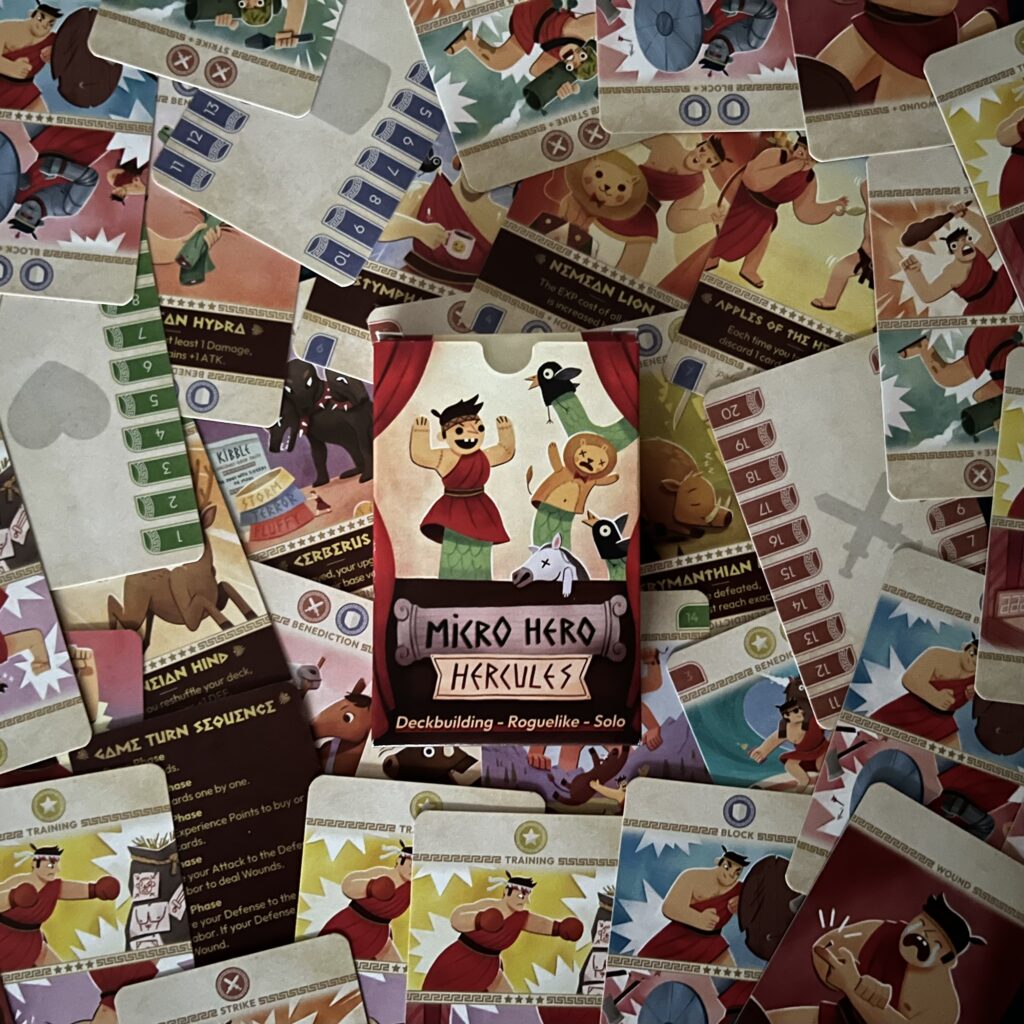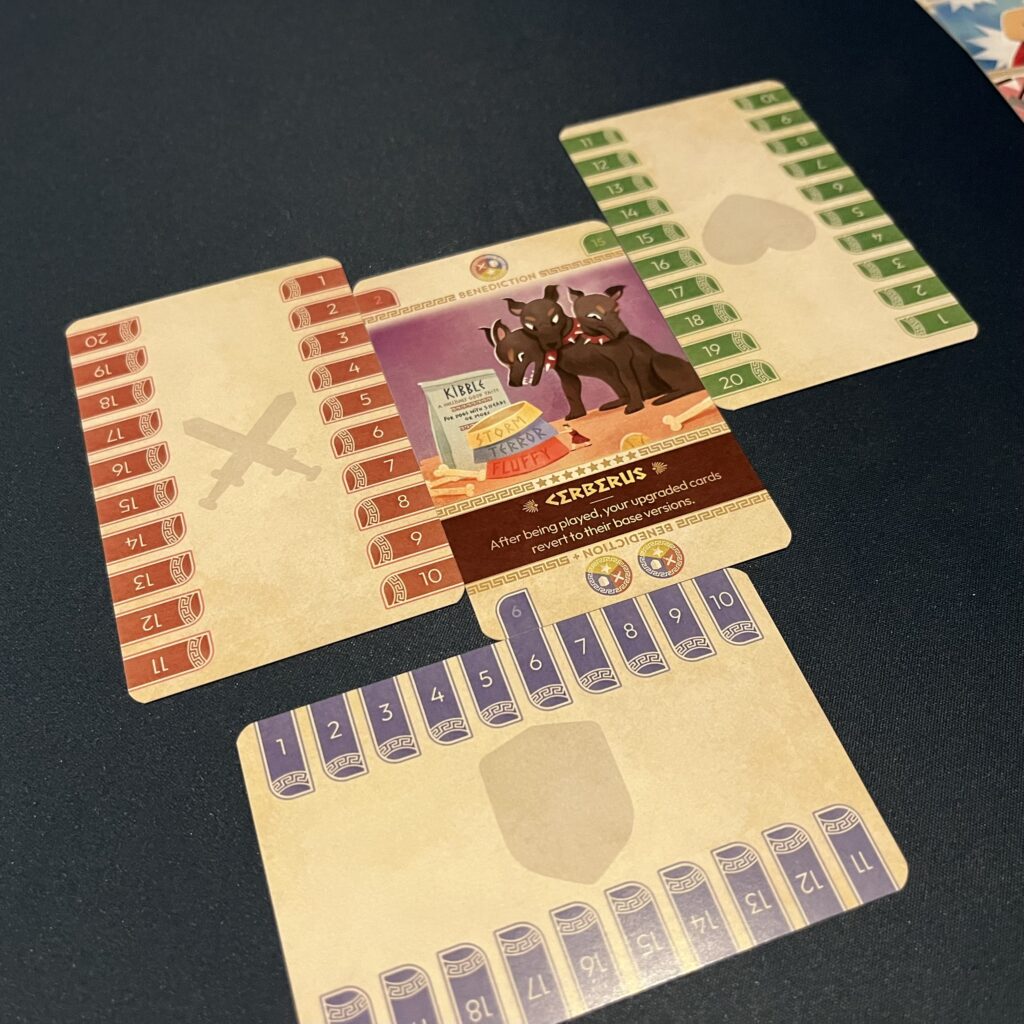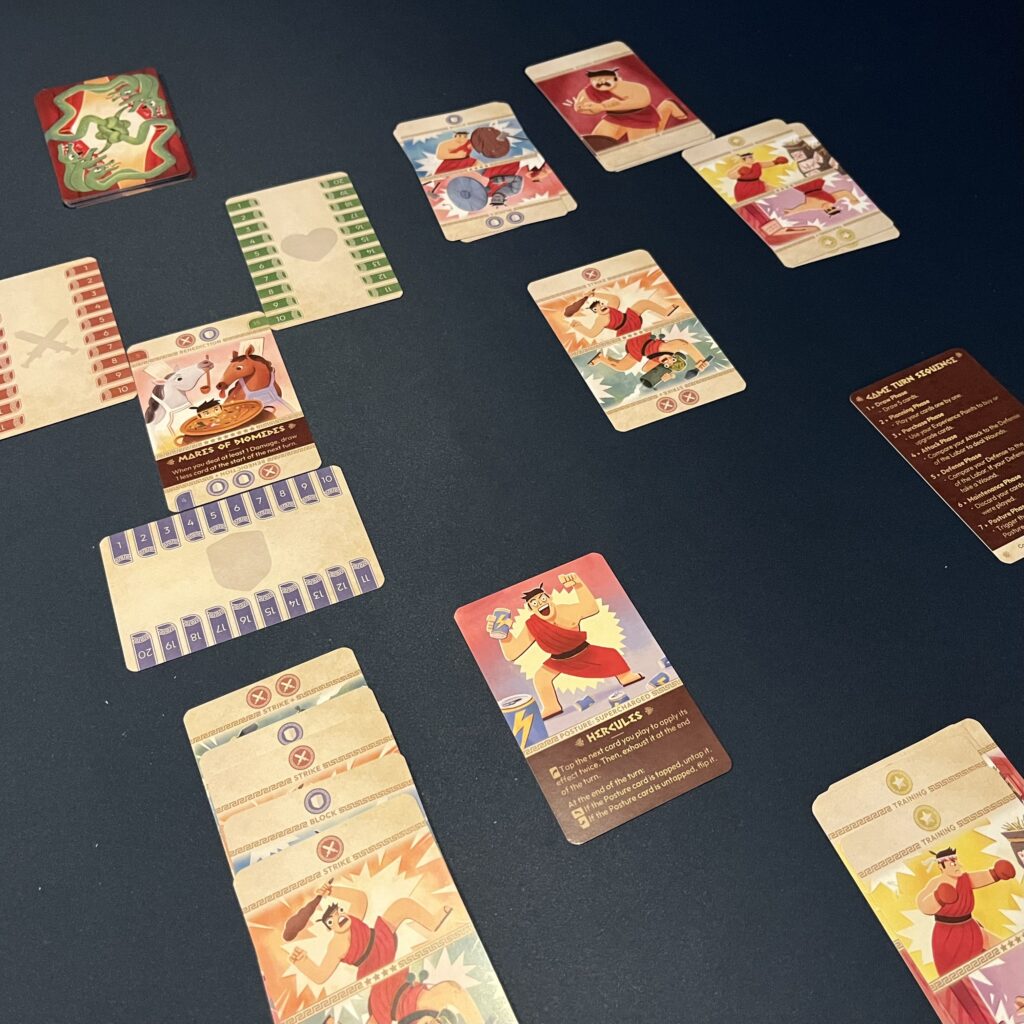In this first volume of Micro Hero – a new deckbuilder roguelike game system for solo gamers – Hercules and his 12 labors take center stage, but not in the way you might think. Hercules, in fact, is a character in a hand puppet theater. Micro Hero is a new game system from Léandre Proust, the publisher and author of Clash of Decks. Like Clash of Decks, each Micro Hero game contains a small deck that you can further expand and/or combine. A deck, by the way, can be obtained for a small amount since Grammes Edition allows players to pay whatever they want. So in the first Micro Hero, players take on the role of Hercules, but new parts are already in the pipeline.
Background & theme
Who is Hercules anyway? Heracles (better known as Hercules by its Roman name and the Disney character of the same name) was one of the heroes of Greek mythology. Hercules is the son of Alkmene after her affair with Zeus, the chief god of the Greek Pantheon. As per his usual m.o., Zeus disguised himself to take advantage of a situation in order to seduce Alkmene. Zeus never properly understood consent. Zeus’ wife -and also sister- Hera, was a jealous creature and fearing the jealousy of Zeus’ wife Hera, Alkmene made her son available to the gods. In the end, it was Hera who took care of the unknown creature, not knowing that it was the love fruit of an affair. Hercules suckled so hard while feeding that Hera squirted her milk across the sky, forming the Milky Way. The divine mother’s milk bestowed Hercules with special powers and supernatural strength.

At one point, Hercules was returned to his biological mother. Hera was so jealous of the affair that she decided to take revenge on the innocent creature instead of her home wrecker husband. Hera drove Hercules mad with rage and in his rage he murdered his wife and children (just like Kratos in God of War! Where would they have gotten the inspiration?). To atone for this act, Hercules was saddled with 12 tasks, the 12 labors of Hercules. Hercules had to:
- kill the Lion of Nemea, a supposedly immortal lion;
- kill the Hydra, a serpent creature with heads that grew back in multiples;
- capture the Hind of Keryneia;
- capture the Erymanthian boar;
- clean out the stables of Augias with 3000 cattle and 30 years of uncleared manure;
- chase away the Stymphalian birds;
- transporting the bull of Crete (which, by the way, King Minos’ wife had a crazy crush on…) ;
- fetching the carnivorous horses of Diomedes;
- win the belt of Hippolyte, queen of the Amazons;
- steal the herd of the three-headed giant Geryones;
- rob the golden apples of the Hesperides, daughters of the titan Atlas; and finally
- kidnap the three-headed hellhound Cerberus from the underworld.
Gameplay
In Micro Hero: Hercules, the same hero takes center stage, but for a different reason. The Hydra is a collective creative theater brain (a bit like Shakespeare) and fan of hard-working puppet theater director Hercules. The Hydra is writing several stories starring Hercules, and players will reenact the play with these 12 short stories to hopefully create a successful piece of hand puppet theater. So in the game Micro Hero: Hercules, players are going to reenact the 12 works I mentioned above.
In this deckbuilder – for a single person – the player is going to compete against the 12 works in 12 rounds of play. The 12 works are shuffled and a random card from this deck is turned face up. Each work has lives, defense points and attack points. Players must defeat all the works and in doing so start to build their own deck of cards, but even more interesting: upgrade these cards as well.


Players draw five cards each round (in principle) and play these cards in an order of their choice. The order is important because the effect of each card played is enhanced by succeeding cards. If you play a card with a single attack symbol as the first card, you perform the effect five times. In this way, the order of cards played is of importance.
With experience points, players can improve cards in the discard pile, by turning them so that more symbols are visible. This is an interesting mechanism, because this puts these better cards back through the pile, allowing you to encounter better cards later in the game. However, you must make sure that you always put your deck back correctly. Players can also buy new cards with experience points.
With attack points, players do damage depending on how often they can attack a multiple of the works’ defense. If you have a 14 attack points and the work has four defense points, you do three damage (because you can successfully attack three times). After this, the work attacks and you can block damage with your defense cards. If you take damage you must take wound card in your deck. This card pollutes your deck and if all wound cards are used up when you have to take new ones, you have lost. You can get rid of these cards by defeating works.
Defeated works also add to your deck and if you manage to defeat all the works you have won. Fortunately, you can save the game between sessions.
Verdict
Mirco Hero is a funny and clever and minimalist game system, allowing a small pile of cards to offer many possibilities and tactics. You have to be careful that the orientation of your deck is correct, and you have to do a little bit of simple head math during your turn to calculate your experience points, attack points and defense points, but it is a simple, successful, streamlined short game with some unique and quirky game mechanics for the solo player which you can easily take with you due to its small footprint.
Interested? You can get your hands on a Micro Hero set on Kickstarter.



